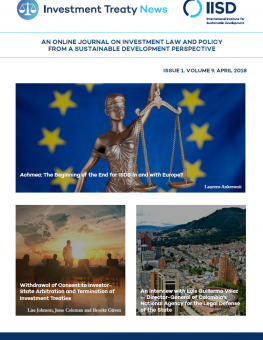
Investment Treaty News (ITN), Volume 9, Issue 1, April 2018
Investment Treaty News (ITN) is IISD’s flagship journal on international investment law and policy.
Investment Treaty News (ITN) is IISD’s flagship journal on international investment law and policy.
Featured articles:
- Achmea: The Beginning of the End for ISDS in and with Europe? By Laurens Ankersmit
- Withdrawal of Consent to Investor–State Arbitration and Termination of Investment Treaties, by Lise Johnson, Jesse Coleman and Brooke Güven
- An interview with Luis Guillermo Vélez – Director-General of Colombia's National Agency for the Legal Defense of the State
Summaries and analysis of recent arbitration awards and decisions:
- ICSID tribunal finds Latvia breached FET under Latvia–Lithuania BIT (UAB E Energija v. Republic of Latvia, ICSID Case No. ARB/12/33), by Gladwin Issac
- ICSID tribunal declines jurisdiction: Timor-Leste never consented to ICSID arbitration (Lighthouse Corporation Pty Ltd and Lighthouse Corporation Ltd, IBC v. Democratic Republic of Timor-Leste, ICSID Case No. ARB/15/2), by Trishna Menon
- ICSID tribunal dismisses expropriation case against Venezuela on jurisdictional grounds (Fábrica de Vidrios Los Andes, C.A. and Owens-Illinois de Venezuela, C.A. v. Bolivarian Republic of Venezuela, ICSID Case No. ARB/12/21), by Bettina Müller
- Solar energy claims brought by German investors against Czechia are dismissed (Jürgen Wirtgen, Stefan Wirtgen, Gisela Wirtgen and JSW Solar (zwei) GmbH & Co. KG v. Czech Republic, PCA Case No. 2014-03), by Mintewab Abebe
- Venezuela held liable for unlawful expropriation of fertilizer plants (Koch Minerals Sárl and Koch Nitrogen International Sárl v. The Bolivarian Republic of Venezuela, ICSID Case No. ARB/11/19), by Claudia Arietti
Visit www.iisd.org/itn for back issues of ITN, as well as news updates.
Participating experts
You might also be interested in
CSDDD: EU's Due diligence law vote should drive supply chain sustainability efforts
The European Parliament has voted to adopt the Corporate Sustainability Due Diligence Directive, aiming to address the environmental and social impacts of the supply chains of Europe's large corporations.
Ecuador Referendum Rules Out ISDS Return, Underlining Public Support for a Sustainable Path
Ecuador has voted to allow international arbitration and investor–state dispute settlement (ISDS) in its treaties and agreements. But the risks that initially made them turn away from this outdated model remain.
The Investment Facilitation for Development Agreement: A reader's guide
A subset of World Trade Organization members has finalized the legal text of an Agreement on Investment Facilitation. This Reader's Guide provides an overview of what's in the agreement.
IISD: EU’s historic Energy Charter Treaty vote will boost energy transition
The European Parliament has voted for the European Union to withdraw from the climate-threatening Energy Charter Treaty.